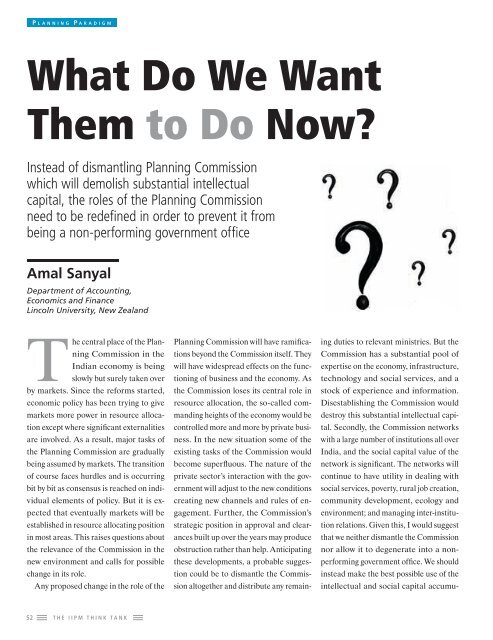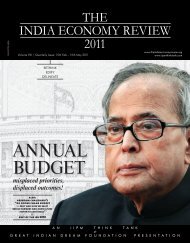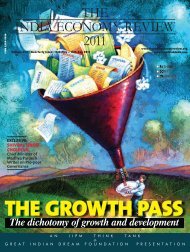Download - The India Economy Review
Download - The India Economy Review
Download - The India Economy Review
Create successful ePaper yourself
Turn your PDF publications into a flip-book with our unique Google optimized e-Paper software.
P LANNING P ARADIGM<br />
What Do We Want<br />
<strong>The</strong>m to Do Now?<br />
Instead of dismantling Planning Commission<br />
which will demolish substantial intellectual<br />
capital, the roles of the Planning Commission<br />
need to be redefi ned in order to prevent it from<br />
being a non-performing government offi ce<br />
Amal Sanyal<br />
Department of Accounting,<br />
Economics and Finance<br />
Lincoln University, New Zealand<br />
<strong>The</strong> central place of the Planning<br />
Commission in the<br />
<strong>India</strong>n economy is being<br />
slowly but surely taken over<br />
by markets. Since the reforms started,<br />
economic policy has been trying to give<br />
markets more power in resource allocation<br />
except where signifi cant externalities<br />
are involved. As a result, major tasks of<br />
the Planning Commission are gradually<br />
being assumed by markets. <strong>The</strong> transition<br />
of course faces hurdles and is occurring<br />
bit by bit as consensus is reached on individual<br />
elements of policy. But it is expected<br />
that eventually markets will be<br />
established in resource allocating position<br />
in most areas. This raises questions about<br />
the relevance of the Commission in the<br />
new environment and calls for possible<br />
change in its role.<br />
Any proposed change in the role of the<br />
52 THE IIPM THINK TANK<br />
Planning Commission will have ramifi cations<br />
beyond the Commission itself. <strong>The</strong>y<br />
will have widespread effects on the functioning<br />
of business and the economy. As<br />
the Commission loses its central role in<br />
resource allocation, the so-called commanding<br />
heights of the economy would be<br />
controlled more and more by private business.<br />
In the new situation some of the<br />
existing tasks of the Commission would<br />
become superfl uous. <strong>The</strong> nature of the<br />
private sector’s interaction with the government<br />
will adjust to the new conditions<br />
creating new channels and rules of engagement.<br />
Further, the Commission’s<br />
strategic position in approval and clearances<br />
built up over the years may produce<br />
obstruction rather than help. Anticipating<br />
these developments, a probable suggestion<br />
could be to dismantle the Commission<br />
altogether and distribute any remain-<br />
ing duties to relevant ministries. But the<br />
Commission has a substantial pool of<br />
expertise on the economy, infrastructure,<br />
technology and social services, and a<br />
stock of experience and information.<br />
Disestablishing the Commission would<br />
destroy this substantial intellectual capital.<br />
Secondly, the Commission networks<br />
with a large number of institutions all over<br />
<strong>India</strong>, and the social capital value of the<br />
network is signifi cant. <strong>The</strong> networks will<br />
continue to have utility in dealing with<br />
social services, poverty, rural job creation,<br />
community development, ecology and<br />
environment; and managing inter-institution<br />
relations. Given this, I would suggest<br />
that we neither dismantle the Commission<br />
nor allow it to degenerate into a nonperforming<br />
government offi ce. We should<br />
instead make the best possible use of the<br />
intellectual and social capital accumu-





